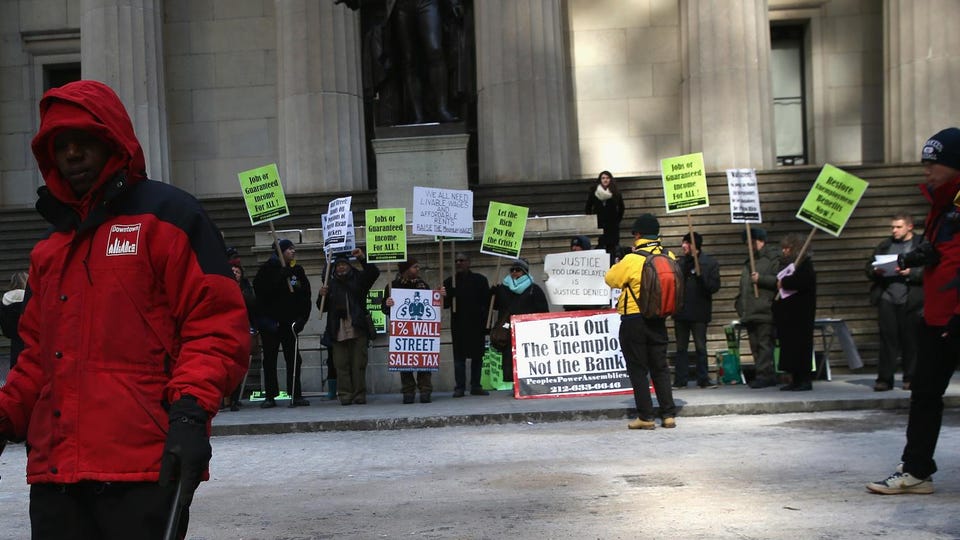Breaking Business Does The Fed Want You To Lose Your Job? It’s Complicated. Derek Saul Forbes Staff I cover breaking news with a focus on markets and sports business. Following New! Follow this author to stay notified about their latest stories.
Got it! Oct 12, 2022, 03:30pm EDT | Share to Facebook Share to Twitter Share to Linkedin Topline Minutes from the Federal Reserve’s latest meeting show the central bank believes a weaker labor market is a necessary condition to bring down inflation, spotlighting a head-scratching but fundamental economic concept that many see lower unemployment and higher wages as bad omens for the economy—and the stock market. Protestors rally at the New York Stock Exchange in 2014. Getty Images Key Facts The Fed said in minutes released Wednesday “a softening in the labor market would be needed to ease upward pressures on wages and prices,” adding the “transition toward a softer labor market would be accompanied by an increase in the unemployment rate,” part of the central bank’s recap of a September meeting during which it approved a 75-basis-point interest rate hike.
Higher wages and lower unemployment rates both seem like good things for the economy, but there is a strong historic inverse relationship between unemployment rates and inflation, demonstrated by the Phillips curve familiar to Economics 101 students, a concept that Fed chair Jerome Powell said in 2018 “continues to be meaningful for monetary policy. ” And right now, the Fed’s primary focus remains on doing everything possible to slow inflation, noting inflation remains “unacceptably high. ” The Fed still has plenty of work to do to cool the labor market: The Labor Department’s hotly anticipated monthly jobs report released Friday revealed that the country added 263,00 jobs, higher than economists’ estimates, and the unemployment rate fell from 3.
7% to 3. 5%, lower than estimates, sending stocks tumbling as investors feared the Fed would pursue even more aggressive interest rate hikes to slow jobs down. Stocks typically fall alongside interest rate hikes as corporate earnings suffer because companies become less willing to borrow money at higher interest rates, and stocks suffered their worst September in over a decade last month, largely because sticky inflation data prompted fears that more rate increases are on the horizon.
Crucial Quote “In their consideration of the appropriate stance of monetary policy, participants concurred that the labor market was very tight and that inflation was far above the Committee’s 2 percent inflation objective,” the Fed wrote as its primary justification for rate hikes, underscoring its desire to see the labor market cool. What To Watch For On Thursday, the Labor Department will release September’s reading of the consumer price index, the most commonly cited inflation measure, though the Fed primarily uses the Bureau of Economic Analysis’ personal consumption expenditure price index to track inflation. Consumer prices are currently more than 8% higher than they were a year ago, far past the Fed’s 2% target.
Big Number 6%. That’s how high unemployment needs to be to tame inflation, Clinton-era Treasury Secretary Larry Summers said Thursday, a more than 70% increase from its current rate. Key Background The Fed has hiked the federal funds rate five times since March to its highest level since 2008.
The market has tanked as rates have surged, with the Dow down 20% year-to-date, on pace for its worst year since the Great Recession. Numerous major companies have conducted layoffs in recent months, most citing poor macroeconomic conditions, including JPMorgan Chase, Goldman Sachs and Snap. Contra Andrew Challenger of the career services firm Challenger, Gray & Christmas said Thursday that the labor market is beginning to show “some cracks,” after his firm reported a massive increase in job cuts and hiring intentions.
Tangent The Fed is relatively powerless in actually affecting the labor market, instead banking on the trickle-down effect of rate hikes leading to slumping corporate profits due to the higher borrowing costs, which also dampen consumer demand. Some criticize the Fed’s hope for higher unemployment as cruel and misguided, including Sen. Elizabeth Warren (D-Mass.
), who wrote in a June Wall Street Journal op-ed : “Make no mistake: If the Fed cuts too much or too abruptly, the resulting recession will leave millions of people—disproportionately lower-wage workers and workers of color—with smaller paychecks or no paycheck at all. ” Further Reading Fed Acknowledges Rate Hikes Will Fuel Unemployment—But Warns Inflation Could Cause ‘Far Greater Economic Pain’ ( Forbes ) Unemployment Rate Fell To 3. 5% In September As Labor Market Added 263,000 Jobs ( Forbes ) Do Higher Interest Rates Hurt The Stock Market? Here’s How Strategic Investors Adjust As Rates Go Up ( Forbes ) Peloton Scales Down, Again—Here Are The Major U.
S. Layoffs This Year ( Forbes ) Follow me on Twitter . Send me a secure tip .
Derek Saul Editorial Standards Print Reprints & Permissions.
From: forbes
URL: https://www.forbes.com/sites/dereksaul/2022/10/12/does-the-fed-want-you-to-lose-your-job-its-complicated/



